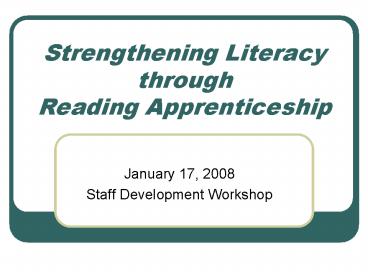Strengthening Literacy through Reading Apprenticeship - PowerPoint PPT Presentation
1 / 21
Title:
Strengthening Literacy through Reading Apprenticeship
Description:
Cognitive. Knowledge Building. Today's Workshop. Capturing Your ... Teach reading process to teach content. Build an inquiry community where thinking is valued ... – PowerPoint PPT presentation
Number of Views:43
Avg rating:3.0/5.0
Title: Strengthening Literacy through Reading Apprenticeship
1
Strengthening Literacy through Reading
Apprenticeship
- January 17, 2008
- Staff Development Workshop
2
Introductions
- 1. Do you expect your students to read a
textbook and/or supplemental readings in your
classes? - 2. How well do your students meet your
expectations?
3
Do You Recognize These Students?
- Are inexperienced readers
- View reading as only a school based activity
- Lack confidence and are mentally passive with
academic reading - Appear to have limited knowledge of topics in
school texts - Have limited comprehension
- Are not held accountable for much reading
- Expend a lot of energy covering up what they
dont understand
4
Video Reading Between the Lives
- The Students Perspective
- On Reading
5
Challenge and Opportunity
- Challenge
- Students (not only under-prepared students) are
not reading in our classes - Opportunity
- Create classrooms in which students can
- become active, successful readers.
6
Reading Apprenticeship
- Metacognitive Conversation
- The professor serves as a master reader to his
or her student apprentices.
7
Dimensions of Reading Apprenticeship
- Personal
- Social
- Cognitive
- Knowledge Building
8
Todays Workshop
- Capturing Your Reading Process
- Think Aloud Procedure
- Classroom Applications
- Save the Last Word for Me
- Question/Answer Relationship
- Annotation
- Assessment
- Ongoing Discussions
9
Reading Apprenticeship makes the invisible
processes of reading visible
- Makes the teachers discipline-based reading
processes and knowledge visible to students - Makes students reading processes, motivation,
strategies and knowledge visible to themselves,
the teacher and to a community of learners. - Helps students gain insight into and take control
of their own reading.
10
Reading Process Analysis Capturing Your Reading
Process
- Increase awareness of your metacognitive
processes while reading - Tap into your own problem solving processes while
reading challenging texts
11
Classroom Application Capturing Your Reading
Process
- Share metacognitive processes
- Set a purpose for reading
- Articulate subject-based expertise in reading
- Introduce comprehension problem solving
strategies - Show new approaches to reading tasks
- Teach reading process to teach content
- Build an inquiry community where thinking is
valued
12
Think Aloud with Textbook Reading
13
Save The Last Word For Me
- Preparation
- 1. Actively read and annotate the text, one
section at a time. - 2. After reading the entire text, highlight at
least two important ideas. - 3. Bring the annotated and highlighted text to
our next class.
14
In Class Activity
- Groups of four with one timekeeper
- First person discusses his/her important idea for
3 minutes. - Everyone else responds to the quote in less than
1 minute. - First person has the last word in 1 minute
- Next person shares his/her important idea.
- Continue until all have shared.
15
QAR Question-Answer Relationship
- Literal
- Read the lines
- Inferential
- Read between the lines
- Critical
- Read beyond the lines
16
Questioning - David
- David woke up fifteen minutes late. As soon as
he saw the - clock, he jumped out of bed and headed for the
shower, afraid - hed miss the bus again. He looked in the dryer
for his favorite - jeans, but they were actually still in the
washing machine. Dang! I - told my sister to put my stuff in the dryer! Now
what am I gonna - wear today? After settling for a pair of baggy
shorts and a Hilfiger - rugby shirt, he grabbed a bag of chips and a soda
from the - kitchen, and searched frantically for his history
book. When he - found it, he put it in his backpack, along with
his breakfast, his hat, - and his lucky deck of cards. As he ran to the bus
stop, he told - himself, I will not stay up late watching
wrestling anymore!
17
QAR Question-Answer Relationship
- Literal
- What did David look for before he left the house?
- Inferential
- Where was David heading that morning?
- Critical
- Should teenagers be allowed to watch television
on school nights?
18
Classroom ApplicationTips for Modeling
Annotation
- Set a purpose
- Provide an overhead of selected text
- Write notes, make connections, create test
questions, make predictions - Circle and underline key vocabulary words in
text - Note problems understanding text
19
Student Outcomes Annotation and QAR
- Provide a purpose for reading
- Give students an independent opportunity to
engage metacognitively with the text - Prepare students to discuss texts and their
reading process - Develop a habit of the metacognitive process
while reading - Create active readers and deepens their thinking
20
ASSESSMENT
21
Reading Apprenticeship
- Ongoing Discussion Group































